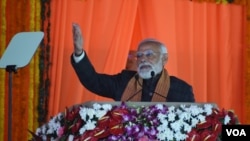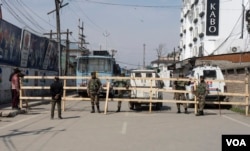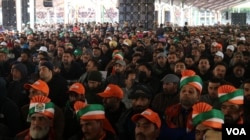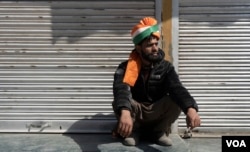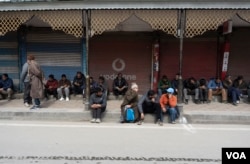Indian Prime Minister Narendra Modi on Thursday visited Indian Kashmir for the first time since his government stripped the Himalayan region of its semiautonomous status nearly five years ago.
Amid tight security, Modi told a crowd that had packed the Bakshi Stadium in the region's capital, Srinagar, that Kashmir has seen significant changes and prospered since his government took action on August 5, 2019.
On that day, the Modi-led Bharatiya Janata Party (BJP) government nullified Articles 370 and 35A of the Indian constitution. Kashmir's loss of its special status led to the division of the region into two federal territories – Jammu and Kashmir, and Ladakh. Both areas are ruled by the central government and have no legislatures of their own.
"Today Jammu and Kashmir is touching new heights of development because J&K is breathing freely today. This freedom from restrictions has come after the abrogation of Article 370," Modi said.
"Few political parties used Article 370 for their own political benefits, but that's over now," he added, apparently referring to the two regional pro-India political parties, the National Conference and the People's Democratic Party, without mentioning their names.
He also alleged that India's main opposition party, the Indian National Congress, commonly known as Congress, and its allies in the region "deceived people, J&K and the nation for political benefits" under the guise of the now-revoked special status.
Kashmiri politicians have described Modi as divisive and anti-minority and have said that the special status designation was a constitutional guarantee, The Associated Press has reported.
Tight security was put in place ahead of Modi's visit to the Muslim-majority region.
Government forces dug holes on the main road and placed wooden rafters in them to erect barricades. Local police also declared Srinagar a "red zone" for drones. Access to the secured compound, decorated with Indian flags, was restricted to individuals with government-approved passes.
Thousands of individuals from the Kashmir valley attended the speech. Some, however, said that the local government forced them to join Modi's gathering as they were government employees.
Their claims were backed by two former chief ministers, Mehbooba Mufti and Omar Abdullah, who shared on social media platform X videos and screenshots of the list of the employees selected by the government to attend.
"Many of us who work for the government had to attend this event at any cost. We were picked up from different places during the middle of the night," a government employee told VOA. He asked not to be named, fearing disciplinary action.
"They made us wear caps in three colors representing the Indian flag when we got into the vehicles. We have been waiting outside since 5 a.m., and we are tired because we haven't had rest," he added.
Many people who said they traveled to Srinagar on their own voiced disappointment, saying they were not allowed to enter the venue where the prime minister was speaking. They said they hoped Modi would listen to their concerns and address them on the spot.
"I am devastated because security didn't let me into the stadium to share my grievance directly," Riyaz Ahmad, a resident of the Kangan area of Ganderbal district, told VOA.
"I come from an economically weaker section of society, and I wanted to tell Prime Minister Modi that people like me can't afford to pay for electricity after the regional government installed smart meters in the valley.”
Manoj Sinha, lieutenant governor of J&K, welcomed Modi and thanked him for re-establishing peace in the valley.
"Thanks to the efforts of Prime Minister Modi, Kashmir, also known as the Valley of Saints, has become peaceful once again," Sinha told the gathering. "Street protests are gone forever."
India and Pakistan have both claimed Kashmir since the two countries gained independence from Britain in 1947. They administer parts of the region with a "Line of Control" as the de facto border. Kashmir has seen clashes involving Indian forces and separatists.
Sinha said that people of J&K have sent a clear message of their huge respect and love for Modi.
"People are standing because there are no seats available in the stadium," the lieutenant governor said. "The figures reveal the affection for the prime minister. Even if there were enough spaces to accommodate 200,000 people, it too would still be overcrowded."
Modi also dedicated "Developed India — Developed Jammu Kashmir," an agriculture development program worth more than $600 million to boost the economy of J&K.
During his speech, Modi announced that he would kick off a campaign to promote J&K as a wedding destination.
"I am starting 'Wed in India' campaign. I urge those planning weddings to come and stay here for a couple of days so that locals can earn their bread and butter," he said. "I won't leave any stone unturned to repay the debt of the love given to me by the people of Kashmir."
Mufti, the former chief minister, while taking a jab at BJP, said that common people in the past thronged venues with great enthusiasm and returned with hope in their hearts.
"But this time Kashmiris know that everything spoken at Bakshi Stadium will be to showcase the so-called benefits of illegal abrogation of Article 370 akin to putting salt to their wounds," she wrote on the X platform.
"This visit is only meant to address and drum support amongst BJP's core constituency in the rest of India for the upcoming parliament elections," she added. The elections are set for April.
Wasim Nabi, Ayesha Tanzeem and Bilal Hussain contributed to this report.




